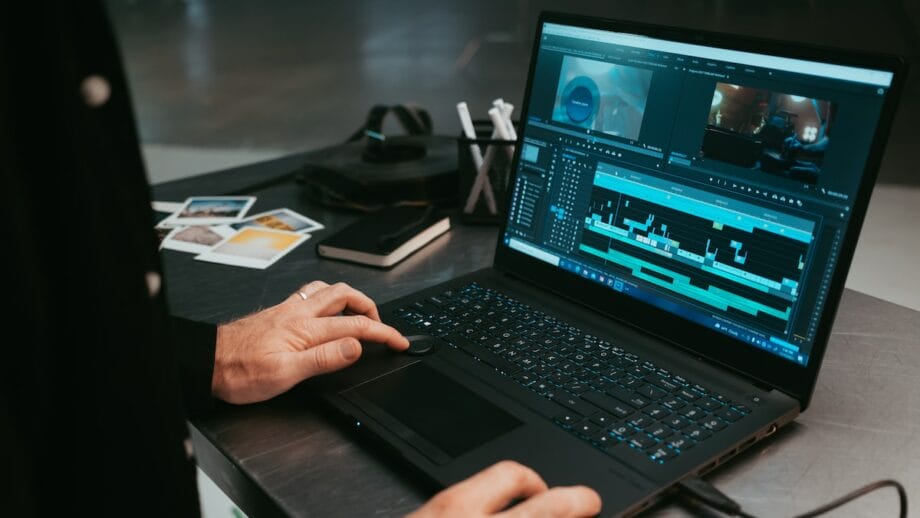Are you in the market for a new personal computer but can’t decide between a laptop and a notebook? You’re not alone. Many folks find themselves scratching their heads, trying to figure out which portable computer suits their needs best.
Lucky for you, we’re here to shed some light on this topic. Did you know that laptops are typically larger and pack more punch in terms of processing power than their sleeker, smaller cousins, the notebooks?
This blog post is your one-stop-shop for understanding all there is about these two types of computers. We’ll dive into what makes each tick – covering everything from portability and battery life to processing prowess and beyond.
By the end of our chat, you’ll have all the info needed to make an informed choice that fits just right with your lifestyle and computing demands.
Ready for the scoop? Keep reading!
What is a Laptop?

A laptop is like a portable office you can carry in your backpack. It’s got everything a desktop computer has, but it’s smaller and runs on batteries. Think of it as your go-to gadget for doing work or playing games on the go.
Laptops usually weigh between 4 to 8 pounds, which means they’re not too heavy to take with you. They come with screens, keyboards, and all the parts inside one case. You can use them almost anywhere – from cafes to classrooms.
Laptops have hard drives or SSDs (which are like super-fast hard drives) for storing all your files and programs. They also have Wi-Fi for connecting to the internet without wires.
Plus, they often come with USB ports so you can plug in other things like a mouse or a printer. Some even have DVD drives, though those are getting rarer these days. With laptops, you’re ready for anything – whether that’s finishing a big project or binge-watching your favorite show.
What is a Notebook?

A notebook is a small, light computer designed for easy carrying. You can think of it as a mini version of the bigger, bulkier laptop. They often have screens 15 inches or smaller, making them perfect for fitting into your bag without weighing you down.
With their sleek design, notebooks are ideal for those who are always on the move but still need to stay connected.
These portable wonders weigh less than 5 pounds and pack just enough punch for web browsing, using social media apps, and other basic tasks. Sure, they might not handle heavy-duty software packages like their larger cousins can, but that’s the trade-off.
Notebooks keep things simple: solid state drives (SSDs) speed up boot times and file access; battery power lasts long enough for most day-to-day activities; and while you might not get an optical drive or numerous ports, you’ll find what you need to stay productive and entertained on the go.
Advantages of Laptops over Notebooks

Laptops have a lot going for them, especially when you stack them up against notebooks. They’re like the Swiss Army knife in the world of computing – packed with features for just about any task. Here are some reasons why laptops might be the better pick:
- More Power under the Hood: Laptops often come with stronger hardware than notebooks. This means they can handle demanding software and multitasking without breaking a sweat. Imagine editing a high-definition video or playing a graphics-heavy game; laptops can do it all.
- Bigger Screens: Usually, laptops sport larger displays compared to their notebook cousins. We’re talking 15 inches or more, which is great for everything from watching movies to designing graphics. A bigger screen can make all the difference if you need more space to work or play.
- Built to Last: With their durable design, laptops are ready for life’s knocks and bumps. While both laptops and notebooks are portable, laptops often have a sturdier build to protect their powerful components.
- Versatility is Key: Laptops win in versatility hands down. They’re not just about web browsing and word processing anymore. Gaming? Check. Video editing? Double-check. Programming? You betcha.
Now that we’ve covered some solid reasons why you might lean toward a laptop over a notebook, let’s flip the script and look at what notebooks bring to the table.
Advantages of Notebooks over Laptops

Picking between a notebook and a laptop can feel like choosing your favorite ice cream flavor. Both have their ups and downs. Today, let’s chat about what makes notebooks stand out from their bigger cousins.
- More money in your wallet: Notebooks tend to be kinder to your bank account. With prices often ranging from $150 to $350, grabbing a notebook won’t break the bank. You can save those extra dollars for something fun, like a new game or a fancy dinner.
- Light as a feather: Packing up and moving is easier with notebooks. They are light and easy to carry around. This makes them perfect for folks who are always on the move or students running from class to class.
- Stays awake longer: Ever been in the middle of something important and your device died? Notebooks have got your back with longer battery life. They can keep going for hours, making them ideal for long trips or coffee shop work sessions without hunting for an outlet.
- Perfect for on-the-go tasks: If you’re someone who mainly uses their device for web browsing, writing, or streaming videos, notebooks are up to the task. They handle light activities like a pro, making them a solid choice for everyday use.
- Keeps things cool: Notebooks often don’t need fans thanks to their efficient design and less demanding tasks. This means they stay cool under pressure without sounding like they’re trying to take off.
Laptop vs Notebook: Which One is Better to Whom?

Choosing between a laptop and a notebook depends on what you need. Here’s a quick guide to help you decide which is right for different types of users.
- Students: Notebooks shine here. They’re light, making them easy to carry around campus. Plus, they have enough juice for taking notes, web browsing, and checking emails.
- Travelers: Go for notebooks too. Their compact size fits perfectly in small bags or backpacks, and they’re great for catching up on work or watching movies during flights.
- Gamers: Laptops are the winners. They pack powerful graphics cards (GPUs) and cooling systems needed for gaming without lag or overheating issues.
- Graphic designers: Laptops again, because they can handle heavy software like Adobe Photoshop with ease thanks to their stronger processors and more memory.
- Writers & bloggers: Notebooks make a good match. The simplicity, battery life, and portability mean writers can work from anywhere without fuss.
- Business professionals: Laptops are better suited here due to their ability to run complex spreadsheets and presentations smoothly when meeting clients or working remotely.
- Tech enthusiasts: Opt for laptops if you love having the latest specs and enjoy tasks like video editing or 3D modeling that demand more computing power.
- Casual users who mainly surf the web and watch videos: Notebooks are perfect since they provide enough performance for entertainment purposes without the extra cost of high-end laptop features you won’t use much.
FAQs

Many people have questions about laptops and notebooks. Here are some common ones to help you understand better.
1. What’s the big deal between a laptop and a notebook, anyway?
Well, it’s kind of like deciding between ice cream flavors – both are sweet, but you pick based on what suits your taste! Laptops are the “everything” treat with more power for things like games or heavy-duty work. Notebooks? They’re lighter and thinner… think of them as your go-to snack that’s easy to carry around.
2. Can I play my favorite games on both devices?
Ah, gaming – the ultimate test! If you’re dreaming of high resolutions and don’t mind something bulkier, laptops are your best bet. They’ve got the muscle (thanks to better graphics cards) for all those epic battles you plan to win. Notebooks? Not so much – they prefer handling simpler tasks.
3. Are notebooks just fancy notepads then?
Not exactly… Think of notebooks as super slim computers – great for writing emails or watching videos without weighing down your backpack. Plus, they have solid-state drives (SSD) which means they start up fast and run quietly!
4. Do laptops come with everything I need built-in?
Pretty much! Laptops often come with CD/DVD drives (remember those?), plenty of ports for plugging in gadgets, and sometimes even touchscreens – it’s like having an entire office ready to go wherever you are.
5. How about taking notes in class or meetings – are notebooks good for that?
Absolutely! With their lightweight design and long battery life, notebooks are perfect pals for note-taking during those never-ending lectures or meetings… Just maybe don’t play solitaire during an important discussion; it doesn’t look too professional.
6. So, which one should I get if I travel a lot but also need to work on the go?
If traveling light is your goal but you can’t sacrifice performance for essential work tasks – or Netflix binges – a notebook might be your match made in heaven: portable enough not to break your back yet capable enough not to leave you hanging when it counts.
Conclusion

So, looking at laptops and notebooks, we see each shines in its own way. Laptops pack a big punch for power users. Notebooks? Perfect for those on the move. Think about what you need – is it speed or sleekness? Maybe jot down your tech needs to see which fits better.
Don’t forget, that Windows machines offer more bang for your buck against Apple’s options if price tags scare you. So what’s your pick? Making that decision just might be easier now. Ready to choose your tech companion? Go ahead, match your needs with what each offers, and make that choice!





